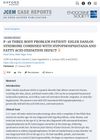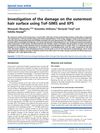 53 citations,
January 2017 in “BioMed research international”
53 citations,
January 2017 in “BioMed research international” Genetically modified plants could be an important source of omega-3 fats to meet global needs.
 35 citations,
May 2015 in “Arquivos De Gastroenterologia”
35 citations,
May 2015 in “Arquivos De Gastroenterologia” Women with PCOS are more likely to have fatty liver disease and worse metabolic health.
26 citations,
March 2006 in “Endocrine, metabolic & immune disorders. Drug targets” This enzyme helps metabolize fatty acids and isoleucine, and could be key in treating neurological diseases and certain cancers.
 1 citations,
December 2015 in “Endocrinology”
1 citations,
December 2015 in “Endocrinology” Decanoic acid may help treat PCOS by reducing androgen levels and improving glucose sensitivity.
 June 2024 in “Current Developments in Nutrition”
June 2024 in “Current Developments in Nutrition” Omega-3 fatty acids may not help and could harm hair loss improvement in middle-aged or elderly men.
 April 2023 in “Journal of Cosmetic Dermatology”
April 2023 in “Journal of Cosmetic Dermatology” There's no strong link between Alopecia Areata, a hair loss condition, and fatty liver, but more research is needed.
 November 2022 in “International Journal of General Medicine”
November 2022 in “International Journal of General Medicine” Women with Polycystic Ovary Syndrome are more likely to have Non-Alcoholic Fatty Pancreas Disease, which is associated with older age, metabolic syndrome, insulin resistance, and high male hormone levels.
 September 2022 in “Biomedicines”
September 2022 in “Biomedicines” Lipid Accumulation Product and Free Androgens Index are effective for assessing fatty liver disease risk in women with Polycystic Ovary Syndrome.
 September 2018 in “Cumhuriyet medical journal”
September 2018 in “Cumhuriyet medical journal” Women with more body hair tend to have thicker belly fat and more metabolic health issues.
 April 2012 in “The Journal of Urology”
April 2012 in “The Journal of Urology” Eating more omega-3 and less omega-6 fatty acids may lower the risk of developing prostate cancer.
 January 2025 in “JCEM Case Reports”
January 2025 in “JCEM Case Reports” Enzyme replacement therapy may help alleviate symptoms in complex cases like this.
 45 citations,
January 2013 in “Journal of Human Reproductive Sciences”
45 citations,
January 2013 in “Journal of Human Reproductive Sciences” Women with PCOS are more likely to have fatty liver disease, especially if they have metabolic problems.
 25 citations,
December 2011 in “Surface and interface analysis”
25 citations,
December 2011 in “Surface and interface analysis” Bleaching hair causes significant damage by breaking down proteins and fatty acids.
9 citations,
June 2020 in “Cell stem cell” Skinny fat cells help wounds heal faster by releasing fatty acids.
 1 citations,
April 2023 in “Frontiers in Immunology”
1 citations,
April 2023 in “Frontiers in Immunology” New treatments for hair loss from alopecia areata may include targeting immune cells, using stem cells, balancing gut bacteria, applying fatty acids, and using JAK inhibitors.
 September 2008 in “Fertility and Sterility”
September 2008 in “Fertility and Sterility” Exposure to fatty acids significantly increased androgen levels in female dogs, suggesting a link to conditions like insulin resistance and PCOS.
 45 citations,
February 2012
45 citations,
February 2012 Obese women with PCOS are more likely to have fatty liver disease.
 36 citations,
May 2021 in “Nutrients”
36 citations,
May 2021 in “Nutrients” Natural molecules like inositols, resveratrol, vitamins, and omega-3 fatty acids may help manage Polycystic Ovary Syndrome (PCOS), but their effects vary and need more exploration.
June 2020 in “The journal of investigative dermatology/Journal of investigative dermatology” Different diets change the fat composition in mouse skin, often reducing beneficial omega-3 fatty acids.
 January 2022 in “European journal of anatomy”
January 2022 in “European journal of anatomy” A man had four testicles, two of which were outside the scrotum and looked like fatty lumps.
 2 citations,
September 2016 in “Journal of skin and stem cell”
2 citations,
September 2016 in “Journal of skin and stem cell” Acne is strongly linked to high BMI, hair loss, menstrual issues, family history, and eating too many sweets and fatty foods, but not to excessive hair growth.
 February 2022 in “International journal of KIU”
February 2022 in “International journal of KIU” Certain genes and nutrients like vitamin D, zinc, and omega fatty acids affect COVID-19 severity and infection risk.
 119 citations,
January 2012 in “Nutrition & Metabolism”
119 citations,
January 2012 in “Nutrition & Metabolism” Modern lifestyles, including poor diet, stress, and long-term use of certain medications, hinder the body's ability to heal from inflammation, leading to chronic diseases.
 95 citations,
February 2018 in “Dermatology and Therapy”
95 citations,
February 2018 in “Dermatology and Therapy” Nutraceuticals may improve skin health and protect against aging, but more research is needed on their optimal use and possible health risks.
88 citations,
July 2001 in “British journal of dermatology/British journal of dermatology, Supplement” The method effectively measures lipid changes and drug effects on skin follicles.
 79 citations,
January 2017 in “Dermatology practical & conceptual”
79 citations,
January 2017 in “Dermatology practical & conceptual” Correcting nutrient deficiencies may help with hair loss, but the benefits of supplements without a deficiency are uncertain and could be harmful.
 71 citations,
January 2019 in “International journal of biological sciences”
71 citations,
January 2019 in “International journal of biological sciences” Exosomes from dermal papilla cells help hair growth by making hair follicle stem cells multiply and change.
 71 citations,
January 2014 in “Journal of Proteome Research”
71 citations,
January 2014 in “Journal of Proteome Research” Women with PCOS have different levels of certain fats and proteins in their blood, which could help diagnose the condition.
 57 citations,
May 2014 in “Molecular Phylogenetics and Evolution”
57 citations,
May 2014 in “Molecular Phylogenetics and Evolution” The research found how GPCR Class A Rhodopsin receptors are related and suggested possible substances they interact with.
34 citations,
July 2020 in “American journal of human genetics” Changes in the SREBF1 gene cause a rare genetic skin and hair disorder.

























